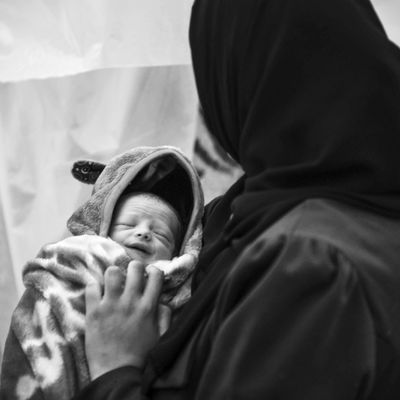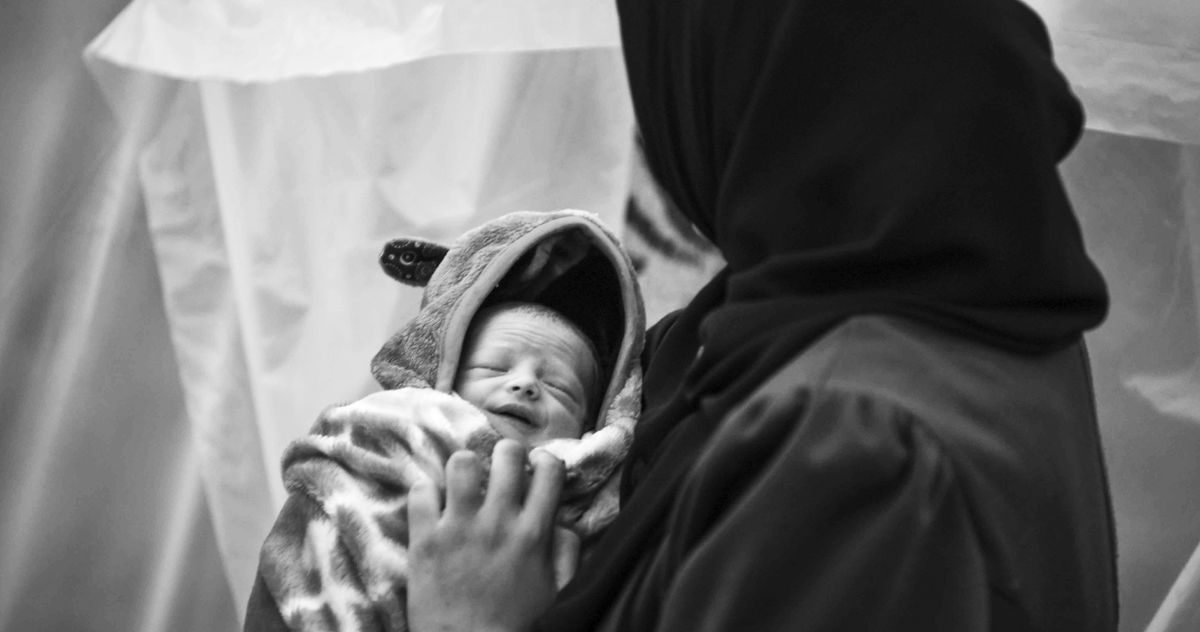
A Gazan mother, Sabreen al-Azami, who was displaced from Beit Lahia city when she was seven months pregnant due to Israeli attacks and took refuge in a tent, is seen holding her daughter Sukkar on her arms in Rafah, Gaza on December 23, 2023. The mother and her baby live in the tent under difficult conditions with health problems.
Photo: Abed Zagout//Anadolu via Getty Images
Since Israel’s campaign against Hamas began last year, health-care workers have reported that miscarriages in Gaza have increased around 300 percent, according to the humanitarian aid group CARE. U.N. agencies have pointed out that women and children are disproportionately bearing the burden of the conflict, not only in terms of casualties, but also in reduced access to health care. The humanitarian crisis is worsened by Israel’s ongoing siege of the territory following Hamas’s October 7 attacks, which cuts off access to food and medical supplies, as well as its airstrikes, which have displaced most Gazans from their homes and into tent encampments. It’s challenging for the estimated 50,000 women who were pregnant at the beginning of the war to carry a healthy pregnancy to term in this environment. Since 21 of Gaza’s 36 hospitals have shut down, and those remaining are overwhelmed treating mass casualties, many women giving birth must do so outside of medical facilities.
The humanitarian-aid group Project Hope has been distributing medical supplies and operating two clinics in Gaza. Its location in Deir al-Balah sees up to 100 patients per day, many of them women and children, while its neonatal clinic in Rafah temporarily paused services in December after it was damaged by an airstrike. I spoke with Rondi Anderson, a trained midwife who advises the group and recently returned from a two-week trip visiting with health-care workers on the ground, about the challenges pregnant women, new mothers, and infants are facing four months into the war.
How have things in Gaza changed since the war started? What are some of the challenges that pregnant people and children are facing now?
There’s much less health care being offered. The situation changes daily. It’s down to around six maternity hospitals; there are more clinics offering prenatal care and sexual and reproductive health care. What that means is those health facilities are seeing five to ten times the number of patients they had been seeing before. There are crowds of a couple hundred people pushing their way to get in to see a doctor who’s now seen a hundred patients, is tired, and might not have the medicine that you need.
One of our clinics hired an OB/GYN to see just pregnant women. The first day, there were 40 pregnant women, and now she’s not seeing much over 50 because that’s about all she can see. Hospitals are also discharging people very early. Women who are post-operative from C-sections are going back to tents quickly. A lot of people have to travel to get to a health-care facility, and in a situation where there’s violence going on, where they feel scared to be on the street, any amount of traveling, even if it’s ten miles, can be prohibitive. I heard stories of pregnant women waiting a long time for the ambulance to come, or having to go to a hospital that the IDF said they were going to attack.
What complications are pregnant people experiencing?
One of the biggest ones is anemia. The leading cause of death in pregnant women is postpartum hemorrhage, and women that are anemic are much more at risk. We are hearing stories of women giving birth in the shelters and outside of hospitals. In terms of miscarriages and bleeding during pregnancy, if women have to go a long way to get to the hospital, they can lose a lot of blood and be at risk for infection.
High blood pressure is the other leading cause of maternal death. You need prenatal care, and you need to be checked so that somebody knows what your blood pressure is before you go into labor. The complications can come on very quickly — you can develop pre-eclampsia, for example. The stress of a pregnant woman living in a tent, displaced from her home and seeing and hearing bombs going off, itself is associated with lots of complications, including stillbirth, premature delivery, and miscarriage.
What other factors are making life difficult for pregnant women and new moms?
Food is an issue. We’re starting to see more and more malnourishment. Pain medicine is definitely an issue. For the most part, they do have anesthesia for surgeries. But I know that women discharged immediately after a C-section don’t all get pain medicine. They’re also trying to establish a breastfeeding relationship with the baby when already very stressed and in a lot of pain. If you have to bottle-feed a baby in this setting, the risk of the baby dying from diarrhea and other diseases is really high, because the water isn’t good.
What other impacts have there been on infants?
What we do to monitor fetuses — making sure the baby’s growing well, listening to the fetal heart tone, making sure there’s adequate amniotic fluid — isn’t happening for the majority of women because they’re not accessing prenatal care. We know there’s more prematurity with stress and malnutrition, and that premature babies are very vulnerable. They don’t feed as well, and many of them need some kind of support: oxygen, temperature control, antibiotics, or IV fluids. If the babies don’t have access to those things or they’re discharged from the hospital early, they’re more likely to have problems and even die.
We also know that there’s infectious disease going around, including hepatitis A and diarrheal diseases. Vaccines and all the ways that we protect kids are compromised because the primary health-care system is compromised. There used to be between 70 to 75 primary health centers in Gaza and now there are only five or six. That means most of the places where women go to get their babies early immunizations, check how they’re growing, and make sure that they are getting the supplements they need are not available.
After spending some time in Gaza, what left the biggest impact on you?
People there are persevering and doing their best. I talked to a midwife who did a C-section after a woman had died. A bomb went off and the woman was killed in that explosion; the midwife jumped into action because the mother was gone, but the baby was still alive. I can’t imagine having the presence of mind to do that. It is incredibly heroic. People are willing to give their last drop of energy to take care of each other. Most doctors and other health-care workers are living in tents themselves, displaced after having their houses destroyed and many of their loved ones killed. They are facing the same food insecurity. It makes a powerful statement that they are as resilient as they are.
This interview has been edited and condensed for length and clarity.





More Stories
United Healthcare’s ransomware attack shows why supply chains are under siege
Nutrition Tips For Ramadan | JM Nutrition
Probiotics for IBS | The Nutritionist Reviews